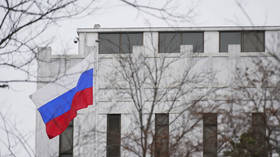Embassy responds to Meta permitting hate speech against Russians

Russia has demanded that US authorities take action to stop ‘extremism’ and threats against its citizens online, after Facebook’s parent firm Meta said it would permit calls for violence against Russians in the context of Moscow’s offensive in Ukraine.
“We demand that [US] authorities stop the extremist activities of Meta, take measures to bring the perpetrators to justice,” Russia’s US Embassy tweeted on Friday. “Users of Facebook [and] Instagram did not give the owners of these platforms the right to determine the criteria of truth and pit nations against each other.”
The statement follows remarks from Meta earlier in the day, which confirmed it would allow violent threats against Russians under certain conditions on both Facebook and Instagram.
“As a result of the Russian invasion of Ukraine we have temporarily made allowances for forms of political expression that would normally violate our rules like violent speech such as ‘death to the Russian invaders.’ We still won’t allow credible calls for violence against Russian civilians,” said spokesperson Andy Stone.
☝️We demand that 🇺🇸 authorities stop the extremist activities of @Meta, take measures to bring the perpetrators to justice. Users of #Facebook & #Instagram did not give the owners of these platforms the right to determine the criteria of truth and pit nations against each other. https://t.co/1RkrjRmEtApic.twitter.com/sTacSm4nDt
— Russian Embassy in USA 🇷🇺 (@RusEmbUSA) March 11, 2022
The ban on anti-Russian hate speech would reportedly be lifted only in selected countries, including Ukraine, Russia, Poland, Latvia, Lithuania, Slovakia, Hungary, and Romania.
The update to the company’s ‘hate speech’ policy was first reported by Reuters, which cited internal Meta communications stating that “calls for violence against Russians are allowed when the post is clearly talking about the invasion of Ukraine.” Similar “credible” threats against Russian prisoners of war or civilians would not be permitted, according to the agency. Meta also reportedly allowed its users to issue death threats to Russian President Vladimir Putin and Belarusian leader Alexander Lukashenko personally.
Daniel McAdams of the libertarian Ron Paul Institute for Peace and Prosperity has blasted the decision by Meta, arguing that its platforms are now “encouraging calls for violence against innocent people” despite Meta implying that the policy change would target the Russian military only.
RPI's Daniel McAdams: 'Facebook OKs Calls for Violence Against Russians'https://t.co/o0cUDP6XIVpic.twitter.com/h6PpT9fcyz
— Ron Paul Institute (@RonPaulInstitut) March 10, 2022
“It is very clear that we are not progressing as a society toward ever-more liberal values. We are regressing to a violent, feral state. Endlessly looking inward for enemies to destroy,” he said.












